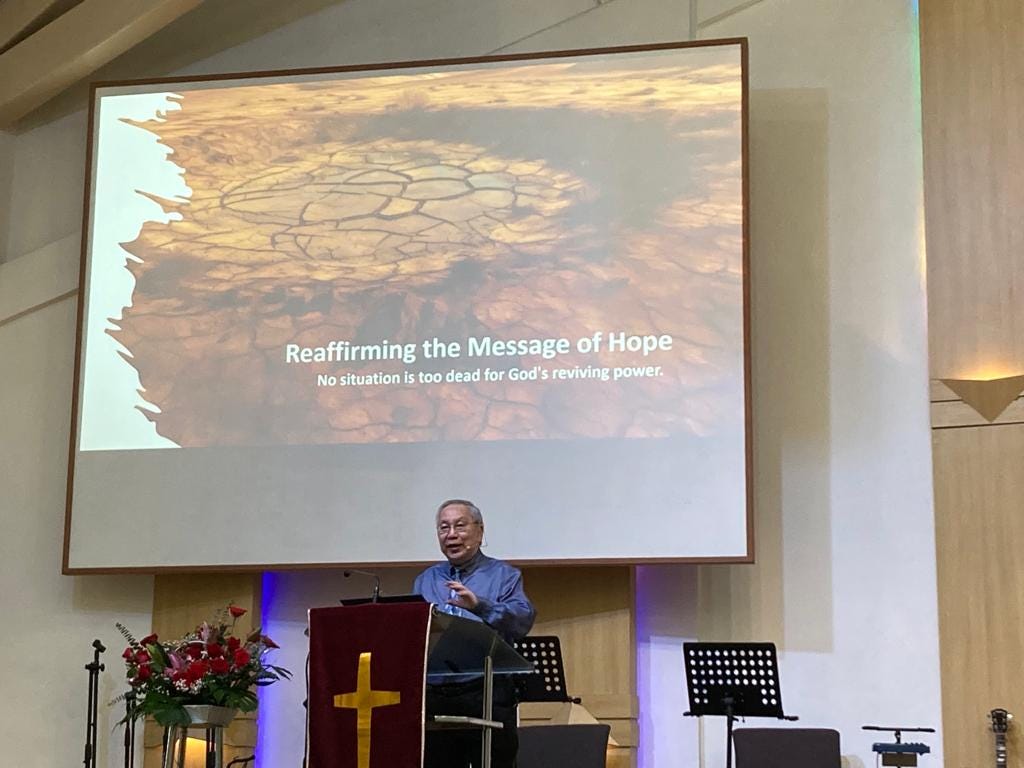Advent is my favourite season of the year. As the year draws to a close with numerous moments of drama, joy, and pain, I look forward to December, my designated Sabbath month: time for reflection, contemplation, and prayers. This is also the season of Advent, which always reminds me of hope. The first advent culminated in the birth of God incarnate to a young girl, and hope became flesh.
Advent, originating from 'adventus,' the Latin term for 'coming,' is a multifaceted season in the Christian calendar that transcends the mere anticipation of Christmas. It is a sacred period of spiritual introspection, a time for us to prepare our hearts and minds to celebrate the historical birth of Jesus Christ and contemplate His promised return. This dual nature of Advent imbues it with a depth and richness that is both reflective and forward-looking.
At its core, and this is what I enjoy most, Advent is an invitation to journey inward. It is a call to quiet contemplation amidst the often frenetic pre-Christmas activities. This introspection allows us to examine our lives in the light of Christ's teachings, considering how we might live more fully in alignment with those principles. It's a time for personal and communal reflection on themes such as love, peace, forgiveness, and hospitality in the almost-over-year virtues Jesus exemplified in His life and ministry.
Moreover, Advent is also a season of preparation, mirroring the preparations made over two millennia ago in Bethlehem and in hearts waiting for a Messiah. It's a time to make room spiritually for the arrival of Jesus, to clear away the clutter of the mundane and the superfluous, and to focus on the essential truths of the Christian faith. This preparation is not about external decorations and celebrations. Still, more importantly, it is about an internal readiness, a willingness to receive and embrace the lessons and love that Christ brings.
The anticipation of Christ's return, the Parousia, is another significant aspect of Advent. This eschatological dimension encourages us to look beyond the present and live in a hopeful expectation for the ultimate fulfilment of God's promises. It's a reminder that the story of salvation is ongoing, and everyone plays a part in this divine narrative. This aspect of Advent fosters a sense of global and historical connectedness among Christians, uniting them in a shared hope and common destiny.
Furthermore, Advent is a time of renewal. Just as nature cycles through seasons of death and rebirth, Advent invites us to experience a personal renewal – to shed old habits or ways of being that hinder spiritual growth and to embrace new ways that foster a deeper relationship with Christ. This renewal is personal and communal, affecting our lives within our families, communities, and the world.
Advent is more than a countdown to Christmas; it is a rich, multi-dimensional season inviting reflection, preparation, anticipation, and renewal. It is a time when our narrative's past, present, and future converge, offering a profound opportunity to deepen our faith and recommit ourselves to the journey of hope.
Reflection on Hope
The Hope of Promise
Isaiah 9:6, with its prophecy, "For unto us a child is born, unto us a son is given...," is a cornerstone of Advent's message of hope. This verse does not merely predict the birth of Jesus; it encapsulates the entire Christian narrative of redemption and divine intervention. In Advent, this promise takes on a special significance, serving as a reminder of the miraculous intervention in human history through the birth of Christ. This child, heralded by prophets, embodies the fulfilment of a long-awaited hope that extends beyond mere earthly salvation and touches the eternal. It speaks to the heart of God's plan for humanity, offering not just peace and salvation but a transformative love that changes the very fabric of existence.
Patience in Hope
The call to patience in Romans 8:25 resonates deeply during Advent. "But if we hope for what we do not see, we wait for it with patience," speaks to the essence of faith – believing and hoping in something beyond our current sight and understanding. This verse invites us to consider the virtue of patience not as passive waiting but as an active and hopeful anticipation of God's promises. It encourages trust in God’s timing, recognising that our human timelines are often limited in scope. Therefore, the Advent season becomes a period of learning to wait with grace and faith, trusting that what is unseen is not unrealised. It teaches us that in the grand design of God, every moment has its purpose and significance.
Illuminating Hope
John 1:5's declaration, "And the light shineth in darkness; and the darkness comprehended it not," offers a powerful image of hope as an unquenchable light. In the context of Advent, this imagery is particularly poignant. Christ is portrayed as the eternal light, piercing through the darkest of circumstances, a light that no shadow can diminish. This verse invites us to find hope in the most challenging times and to recognise that even in moments of great darkness, the light of Christ is ever-present and indomitable. It encourages a perspective where hope is seen as an active force, dispelling fear and despair and illuminating paths toward peace and reconciliation.
Contemplation and Readiness
As 2 Corinthians 13:5 suggests, Advent is a time for weighty introspection and preparation. "Examine yourselves, to see whether you are in the faith. Test yourselves," is not just a call to self-assessment but an invitation to a deeper, more meaningful engagement with our faith. It encourages us to look within, discern areas of spiritual growth, and recommit to a life that reflects Christ-like values. This season of Advent should be a catalyst for spiritual renewal, an opportunity to align our hearts and actions with the teachings of Christ. It is a time to prepare not just our homes but our very beings for the coming of Jesus, making ready a place within us where His love and teachings can dwell and flourish.
Hope in Contemporary Times
In today's complex and often challenging world, marked by rapid changes, uncertainties, misinformation and false information, regional wars and conflicts, the Advent message shines as a vital source of hope and resilience. It stands as a reminder that amidst the chaos and struggles of life, there exists a steadfast promise of peace and renewal. The words of Philippians 4:6-7, "Do not be anxious about anything, but in every situation, by prayer and petition...," serve as a powerful antidote to the anxieties and fears that often pervade our daily existence. This scriptural passage does not merely advise against worry; it provides a practical approach to finding peace through prayer, petition, and thanksgiving. It promises that God's peace, transcending all human understanding, will guard our hearts and minds in Christ Jesus, offering a profound sense of security and hope in a world that sometimes feels overwhelmingly insecure.
Advent's call to hope is to see beyond these immediate challenges to a larger narrative of redemption and divine care. It encourages us and those beyond the faith community to hold onto hope as a tangible force to drive positive change and personal transformation.
Moreover, with its emphasis on hope, the Advent season offers a counter-narrative to the often materialistic and consumer-driven approach to the holiday season. It invites individuals to find joy and fulfilment not in the temporary and the material but in the eternal and spiritual. This perspective fosters a sense of community, compassion, and empathy, encouraging actions and attitudes that reflect the love and peace of the season.
Conclusion
As we approach the Advent season, it is essential to recognise that this period is more than just a lead-up to the festive celebration of Christmas. It is a journey towards a deeper understanding and living out of hope as taught and exemplified in Christian teachings. Advent reaches beyond the confines of religious observance, offering a universal message that resonates with people across different walks of life. It speaks of hope, peace, and love as fundamental human experiences and aspirations.
Embracing Advent thus becomes an opportunity to reflect on its profound promises. It's a time to prepare our hearts and minds, not just for a holiday, but for a renewed experience of joy and hope that can sustain us throughout the year. As we engage with the traditions and practices of this season, let us do so with an awareness of the deeper truths they symbolise. May the journey of Advent enrich our lives, bringing an enduring sense of joy and hope that permeates our being and influences our actions, making us agents of hope in a world that so desperately needs it.





